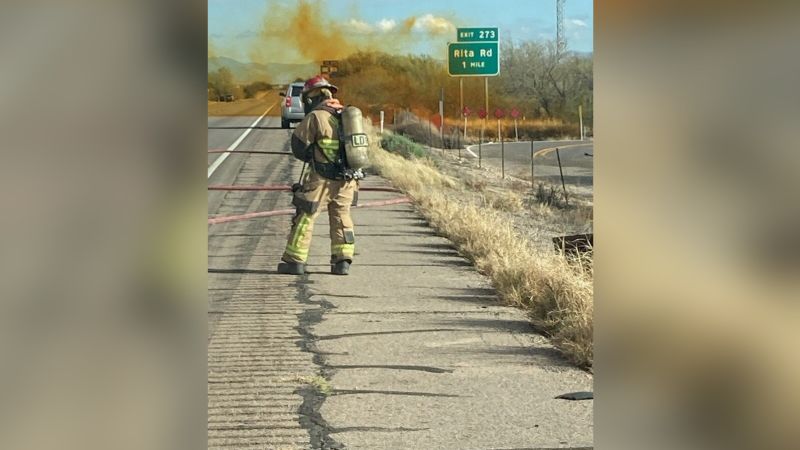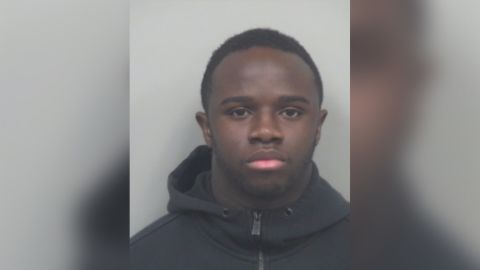CNN
—
The 19-year-old White man who killed 10 people in a racist mass shooting at a grocery store in a predominantly Black area of Buffalo last May apologized to the victims’ families and was sentenced to life in prison during an emotional court hearing Wednesday.
“I’m very sorry for all the pain I forced the victims and their families to suffer through. I’m very sorry for stealing the lives of your loved ones. I cannot express how much I regret all the decisions I made leading up to my actions on May 14,” Payton Gendron, wearing an orange jumpsuit and shackles, said in court.
“I did a terrible thing that day. I shot and killed people because they were Black. Looking back now, I can’t believe I actually did it. I believed what I read online and acted out of hate. I know I can’t take it back, but I wish I could, and I don’t want anyone to be inspired by me and what I did.”
The statement came during the state sentencing hearing for Gendron, who pleaded guilty in November to one count of domestic act of terrorism motivated by hate, 10 counts of first-degree murder, three counts of attempted murder and a weapons possession charge for the mass shooting at Tops Friendly Markets on May 14, 2022.
A number of victims’ family members spoke emotionally Wednesday about how the mass shooting had changed their lives. At one point, Gendron took off his glasses and began crying during the testimony from the victims’ families.

At another point, a man in a gray sweatshirt rushed at Gendron in court but was quickly blocked by security, and Gendron was taken out of the courtroom.
After a short break, Gendron returned to the courtroom and Erie County Court Judge Susan Eagan restarted the hearing.
“We cannot have that in the courtroom,” Eagan said. “We must conduct ourselves appropriately because we are all better than that.”
In the end, the judge sentenced Gendron to life in prison on each of the terrorism and murder charges and offered a stern rebuke of him.
“There is no place for you or your ignorant, hateful and evil ideologies in a civilized society,” she said. “There can be no mercy for you, no understanding, no second chances. The damage you have caused is too great, and the people you have hurt are too valuable to this community. You will never see the light of day as a free man ever again.”
Erie County District Attorney John J. Flynn said after court the sentence put legal closure on the case, but not on the broader issues.
“It certainly does not put any closure on what we need to do as a society and a community going forward,” Flynn said. “Justice was done with a small ‘j’ today, but we still have a big ‘J’ of Justice to do.”

The attempted attack on Gendron came during a particularly intense victim impact statement by Barbara Mapps, the sister of Katherine Massey, a 72-year-old who was killed in the attack.
“I want personally to choke you,” Mapps said in a loud voice. “Your little punk a** decided to come here to kill Black people.”
Flynn said the man will not be charged with a crime, explaining he did not want to compound the tragedy.
Other families of victims offered more somber memories of their loved ones and criticisms of Gendron’s violent actions and hateful ideology. Many of the victims’ family members voiced that they wish for Gendron to be sentenced to life in prison, rather than the death penalty, so the shooter will have to suffer with his thoughts for the rest of his life.
“One day I hope you find it in your heart to apologize to those families,” Wayne Jones, the son of Celestine Chaney, said in court.

“I pray to God they do not kill you,” said Brian Talley, family member of shooting victim Geraldine Talley. “You need to be known worldwide … I forgive you, but I forgive you not for your sake, but for mine and for this Black community.”
Christopher Braden, who said he was shot in his leg, said he saw dead bodies on the floor as he was led out of the supermarket to the hospital.
“The visions haunt me every day,” Braden said, adding he continues to suffer from night terrors and post-traumatic stress disorder from the shooting.
Zeneta Everhart, whose son Zaire Goodman was shot and injured, said her son has survivor’s guilt.
“He is dealing with the pain that I as a mother cannot bear,” Everhart said. “On that day this terrorist made the choice that the value of a Black human meant nothing to him … whatever the sentence is that [Gendron] receives, it will never be enough.”
Michelle Spight, who said she lost her aunt and her cousin in the shooting, said she hopes Gendron is haunted every day and every night.
“You came to Buffalo with hatred and anger in your heart,” Spight said, also speaking on behalf of her other family members.
Speaking after court, several Buffalo officials and families said they did not believe Gendron’s apology was genuine. Everhart said the gunman should be scared.
“Yes, somebody rushed at [Gendron] today in the courtroom, but that’s the emotion that all of these families feel on the inside,” Everhart said. “I feel like that every single day. We all feel like that every single day. I was happy to see him scared today. He should be able to feel what those families felt that day when he pointed that gun in their faces. That is how he should feel all day, every day.”
On the afternoon of May 14, Gendron turned the community’s source of necessities into a crime scene.
Gendron was heavily armed and wore tactical gear – including a tactical helmet and plated armor, police said at the time. He also livestreamed his actions using a camera.
Using an illegally modified semi-automatic rifle, the gunman shot four people outside the grocery store – three of whom died. He continued the massacre inside the store, fatally shooting an armed security guard and eight others, six of whom didn’t survive.
The shooting traumatized the predominantly Black neighborhood of Masten Park on Buffalo’s east side. The area was a food desert and the Tops Friendly Markets was the only supermarket in the neighborhood.
Gendron shot a total of 13 people, including 11 Black people and two White people, authorities said. All the victims killed were Black.
Prosecutors have argued the horror that unfolded both inside and outside the supermarket was rooted in Gendron’s racism toward Black people. Evidence included social media posts and a lengthy document written by Gendron, revealing he had planned the attack and visited the supermarket several times prior to the massacre.
Gendron posted he chose the Tops market as his target because it’s located in the 14208 ZIP code in Buffalo which is home to the highest percentage of Black people close enough to where he lived in Conklin, New York.
In the document, he attributed the internet for most of his beliefs and describes himself as a fascist, a White supremacist and an antisemite.
The shooter’s charges included the first use of New York’s terrorism motivated by hate charge since it became available in 2020 under state law.
On the federal level, Gendron faces 10 counts of hate crime resulting in death, three counts of hate crime involving bodily injury, 10 counts of use of a firearm to commit murder during and in relation to a violent crime, and three counts of use and discharge of a firearm during a violent crime, according to a criminal complaint.
He has pleaded not guilty to the federal charges, which carry the potential for the death penalty.
In December, Gendron’s attorneys said during a court hearing he would be willing to plead guilty to the federal charges if prosecutors agreed to remove the death penalty as punishment.
Correction: An earlier version of this story gave the wrong last name for Barbara Mapps.
















